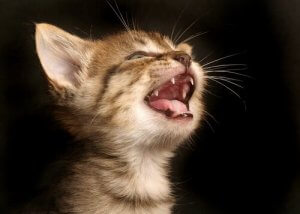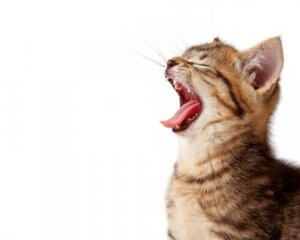Why Does My Cat Meow Constantly?


Written and verified by biochemistry Luz Eduviges Thomas-Romero
Every cat owner wants to be able to understand what their cat is trying to tell them. In comparison with the majority of carnivorous mammals, domestic cats are pretty unusual in terms of how and why they vocalize. So in this article, we’ll try to answer the question: why does my cat meow constantly?
Types of vocalization in cats
According to experts, vocalization in cats – of all different breeds – generally occurs in the context of four different types of situation:
- Aggressive behavior
- When seeking sexual interaction
- Mother-kitten interactions
- Human-cat interactions
In the case of sexual interactions, the vocalization is more of a yowl than a meow. Both females in heat and any nearby males vocalize a lot in this kind of situation.
Interesting facts about the cat’s meow
The meow is the most common form of vocalization during interactions between cats and humans. Studies have shown that it is rarely used in cat-cat interactions. Furthermore, experts have observed that while feral cats do meow when they’re young, they rarely do so as adults.

The meow is a call that seeks to provoke a reaction in humans.
Cats can use vocalizations, purring, and body language to express emotions such as fear, aggression and happiness. Some experts have suggested that it was the domestication process that first caused cats to start using meows in their interactions with humans.
Why does your cat meow?
Of course, how often your cat meows will depend on the breed, and even its personality. Oriental breeds, particularly Siamese cats, are known to be very “chatty”. As such, anyone who doesn’t want a cat that meows a lot should probably avoid these breeds.
Why does my cat meow constantly?
Cats meow for many different reasons. If your pet is meowing excessively, it might be worth considering the following possible causes:
- Sickness: it’s best to start by ruling out any possible illness by booking an appointment with your vet. A number of ailments can cause your cat to feel extreme hunger, thirst or pain, all of which can cause them to meow more than usual.
- Attention: in spite of their famously independent nature, cats don’t like being alone. In many cases, they also meow when they want food.
- Greeting: in this case, they’re simply happy to see you. This is a habit that’s difficult to break.
- Stress: when cats feel stressed, they often become more vocal. Try to discover the source of their anxiety, and help them adapt to the situation.

How to discourage your cat from meowing
If you want to stop your pet meowing for attention, stop reacting to them, and only pay attention to them when they’re quiet. You can also try leaving the room every time they start being noisy again.
But be careful! You should never ignore your pet. It’s important to spend time with them on a daily basis. And remember: a tired pet is a calm pet.
If your cat is meowing for food, don’t feed them when they meow. Wait until they’re quiet. If that doesn’t work, buy an automatic feeder that dispenses food at set times throughout the day.
It’s important to bear in mind that cats usually meow constantly for a good reason: they’re trapped somewhere, they’re hungry, they’re in pain, or they can’t get to the litter box. Always double check to make sure there’s nothing wrong.
Things you should never do to correct your cat’s behavior
Don’t ignore your cat without checking whether there’s a problem, and never punish them for meowing. Punishing them will only make your pet distrust you.
Don’t give in. You’ll need plenty of patience if you want to correct their behavior. If your cat’s in the habit of meowing to get what they want, they’re going to meow louder and more often when they first realize it’s not working.
All cited sources were thoroughly reviewed by our team to ensure their quality, reliability, currency, and validity. The bibliography of this article was considered reliable and of academic or scientific accuracy.
- Nicastro, N., & Owren, M. J. (2003). Classification of domestic cat (Felis catus) vocalizations by naive and experienced human listeners. Journal of Comparative Psychology, 117(1), 44.
This text is provided for informational purposes only and does not replace consultation with a professional. If in doubt, consult your specialist.